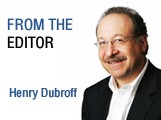What would Louis Lancaster think about our world economy?
 Who was Louis Lancaster? What would he think about the world economy today?
Who was Louis Lancaster? What would he think about the world economy today?
Those are deeply interrelated questions that UC Santa Barbara economics professor Benjamin J. Cohen will be answering when he gives the 65th anniversary talk to the Channel City Club on May 18.
Cohen, who goes by Jerry, holds the Lancaster Chair in International Political Economy at UCSB, which was named for Lancaster, a longtime South Coast resident and co-founder of Santa Barbara Bank & Trust. The influential Lancaster also was founder of the Channel City Club, which hosts an amazingly varied array of notables for lunchtime talks each year.
To get some perspective on the world economy, politics and the Great Recession, I spoke on the phone with Cohen as he was preparing for his lecture. The first thing to realize about Lancaster, said Cohen, is that he was a state department official in the Roosevelt Administration who helped organize the initial meeting of the United Nations in San Francisco at the end of World War II.
In other words, he was present at the beginning of a new era of globalization for the world economy.
The second thing to recognize is that at the time of his death in 1986, the U.S. economy had weathered two oil shocks and a period of high inflation. It was entering an extended period of prosperity and expansion of global trade that many people who lived through the turbulent 1970s thought might never arrive.
Cohen, a specialist in global finance who has been at UCSB since 1991, said that one thing that’s changed in the past few decades is “the extent to which globalization has made the U.S. less insular and more vulnerable.” The sovereign debt crisis in Europe and the prospect for a slowdown in the Chinese economy are going to have far larger impacts on the U.S. than they would have at any time in recent decades.
In some ways, he said, the global economy of today harkens back to the early years of the 20th century, when the world was more tightly integrated even than it is today. Capital flows as a percentage of GDP were much larger than today, and immigration policies meant that “labor migration was far more open in the late 19th century,” Cohen said.
What is significantly different about today’s economy is the way that manufacturing takes place on a global scale. The “multi-nationalization of production,” with computers assembled from components sourced in more than a dozen countries was unthinkable until recent years, said Cohen.
So too, I might add, was the brand extension of software, sports programming and information onto a global platform. And we’ve witnessed in the past year how Europe’s currency union has exacerbated political and economic strains between weak and strong members, pushing Greece to consider dropping out of the Eurozone.
The 2008 financial crisis would have come as an enormous shock to Lancaster, who lived through the Great Depression and came away with a sense that it could never happen again. “It would be a great surprise [to Lancaster] that we actually did it again. We allowed a great bubble to build up and had a great crash comparable to 1929,” Cohen said.
As to how Lancaster would have perceived post crisis policy-making, Cohen said that “anyone who lived through the 1930s and could compare the policies of Hoover with Roosevelt could see that austerity is not the way to go. He would be shocked to see the way in which austerity has come back into fashion. As somebody who worked in the Roosevelt administration in World War II he would have had faith in an activist government.”
However, Lancaster also might be surprised by some of the tools policy-makers have used this time around. “He would be troubled by the size of the Federal Reserve balance sheet and the inflationary consequences,” said Cohen. The federal deficits, are “certainly of a magnitude that any knowledgeable person would worry about.”
Speaking for himself, Cohen thinks that the Obama administration missed a huge opportunity in the early days of the Great Recession to get a bigger stimulus passed in return for meaningful reform in entitlements — Social Security, Medicare and related programs. Such a move would have set the stage for what Lancaster witnessed in the post World War II era. “He saw that intelligent economy policy could promote prosperity and reduce debt dramatically,” said Cohen.
Cohen said it’s likely that Lancaster also would have been deeply concerned about the “extent to which distribution of income has been more and more skewed. He would have been surprised to the extent that wealth has been concentrated — in places like Montecito.” He would be among the first to recognize that the prosperity the U.S. experienced in the post-World War II era was due in part to a sense of shared responsibility across income classes.
Cohen’s takeaway is that no matter how bad things looked in the short term, Lancaster’s experiences taught him that it paid big dividends to be a long-term optimist. An unshakable belief in “the ability of the U.S. to overcome adversity” was a hallmark of his generation.
Cohen’s talk to the Channel City Club starts at 11:30 a.m. on May 18 and takes place at Fess Parker’s DoubleTree Resort in Santa Barbara. RSVPs are due May 15. The cost for club members is $30; for non-members it’s $35. Call (805) 884-6636 or email [email protected] for more information about the event.
• Contact Editor Henry Dubroff at [email protected].









